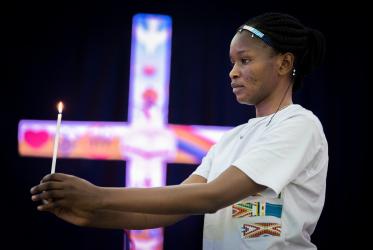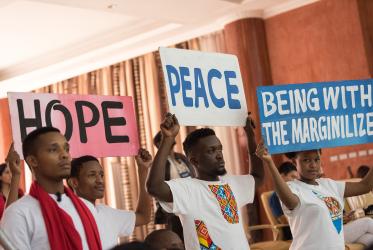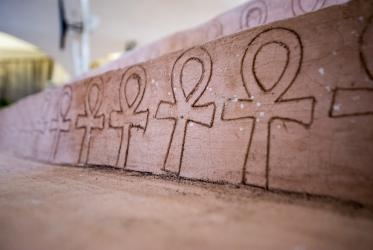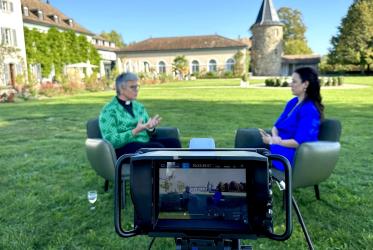What is the state of the ecumenical quest for Christian unity? How does it relate to work for justice and peace? What can we say about the Church in this context?
Addressing these questions was the purpose of the unity plenary session of the World Council of Churches (WCC) Central Committee meeting on Friday, 24 June, in Trondheim, Norway.
Rev Dr. Odair Pedroso Mateus, director of Faith and Order for the WCC, forcefully argued that only a shared vision of the Church can clear obstacles to Christian unity and lead to a common understanding of Christian work in the world.
Moderated by Mary Anne Plaatjies van Huffel of South Africa, the discussion centred on the convergence statement The Church: Towards a Common Vision and reception of the text by the churches.
“It’s up to the churches you represent,” Mateus told the delegates, “to respond to this document and to say to the other churches whether they recognize in this text their own vision of the Church, and if they do, how they may form closer relationships with the other churches.”
Mateus sees the process of coming to terms with The Church as “a quiet though precious and vital dialogue,” a kind of “spiritual ecumenism” in which churches “discover in each other’s churches elements of holiness, catholicity and apostolicity that may have been preserved despite our divisions or significant differences.”
Prof. Dr Marina Kolovopoulou, of the Church of Greece, introducing the document and the 20-year process that led to it, also stressed how the document can be used by churches to recognize the truth—and shortcomings—of their own tradition’s ecclesiological appropriation of the great Tradition.
In some ways, she said, ecclesiology is the most difficult doctrine, and the document itself is “not expressing full consensus but showing convergence and areas to be addressed.” Anchored in the notion of communion—in God, in local churches, in the Church itself—the document’s theological importance lies in its bringing out “the truth we owe each other” about how each church sees itself, its tradition, and its own need for renewal.
In fact, said Sheilagh Margaret Kesting of the Church of Scotland, her church’s own response to the document, jointly composed with the Catholic church there, revealed the need to go beyond the text itself. To grow in unity, she said, “It is not enough for us simply to study the text” but also to find concrete ways of working together and to be seen publicly doing so.
Fr. Andrzej Choromański of the Pontifical Council for Promoting Christian Unity praised The Church as “a step toward full and visible unity of the Church” and described the process by which the pontifical council has elicited responses and begun to formulate its own. He has been surprised and delighted, he said, by the widespread and serious assessments of the text by Catholic theologians, whole faculties, bishops’ conferences and ecumenical organizations around the world, all of which will feed into the council’s own response.
It was Rev. Dr Susan Durber, minister in Taunton United Reformed Church and moderator of the Faith and Order Commission, who pressed most strongly on the concrete, even existential import of the project. “Ecclesiology matters,” she said. “The text [of The Church] came from hands grubby from the dust of daily life, from minds pre-occupied with human suffering, from hearts crying for those in deepest need. It came from those already on a pilgrimage of justice and peace.”
Durber expressed appreciation for The Church’s overcoming misplaced separation of what the Church is and what it does. Summarizing the dynamic core and vital import of the document, she said, “There is God, who has a mission for the world – to heal its brokenness and pain– and God in Christ has called forth the Church to join in with this mission of God. To be part of the mission of God, we need to be healed ourselves, our own brokenness mended, our own divisions overcome, so that we can be a sign and servant of God’s mission for the world. This is why ecclesiology matters.”
Christian unity has a very concrete purpose and contemporary relevance, Durber said. “The church needs to be renewed and to receive God’s gift of communion so that we can be a witness to this gift in the world. What do we think the church is for but to serve God’s great design for the world, somehow to mirror that loving relatedness in mutual exchange of the blessed and holy Trinity, and to participate in God’s work of healing a broken world?”
For more information:







